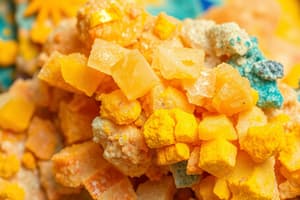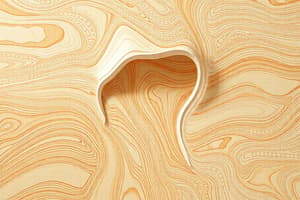Podcast
Questions and Answers
What is the chemical formula for Calcium Sulphate Dihydrate?
What is the chemical formula for Calcium Sulphate Dihydrate?
- CaSO4⋅3H2O
- CaSO4⋅1/2 H2O
- CaSO4
- CaSO4⋅2H2O (correct)
Closed calcination occurs at temperatures between 230°F to 250°F.
Closed calcination occurs at temperatures between 230°F to 250°F.
False (B)
What is the primary product of open calcination of gypsum?
What is the primary product of open calcination of gypsum?
Plaster of Paris
The process of heating gypsum to produce a usable form is known as __________.
The process of heating gypsum to produce a usable form is known as __________.
Match the following types of calcination with their characteristics:
Match the following types of calcination with their characteristics:
What is one characteristic of Plaster of Paris?
What is one characteristic of Plaster of Paris?
What is produced when gypsum is heated at temperatures of 110-120°C?
What is produced when gypsum is heated at temperatures of 110-120°C?
Dental plaster is formed from β-hemihydrate.
Dental plaster is formed from β-hemihydrate.
The chemical equation for the manufacturing of gypsum is CaSO4⋅2H2O -------- __________ + 11/2 H2O.
The chemical equation for the manufacturing of gypsum is CaSO4⋅2H2O -------- __________ + 11/2 H2O.
What type of gypsum is known as Dental Stone with high strength?
What type of gypsum is known as Dental Stone with high strength?
Type I Gypsum is used for making study casts.
Type I Gypsum is used for making study casts.
What is the primary characteristic of the crystals formed in α-hemihydrate?
What is the primary characteristic of the crystals formed in α-hemihydrate?
Type V gypsum is known for its high strength and ________ expansion.
Type V gypsum is known for its high strength and ________ expansion.
Match the following types of gypsum with their uses:
Match the following types of gypsum with their uses:
What is the correct pressure and temperature used during closed calcination?
What is the correct pressure and temperature used during closed calcination?
Crystals formed during β-hemihydrate are more regular in shape than those of α-hemihydrate.
Crystals formed during β-hemihydrate are more regular in shape than those of α-hemihydrate.
What is the ADA classification number for gypsum products?
What is the ADA classification number for gypsum products?
The vicat needle is used to measure ________ time in dental materials.
The vicat needle is used to measure ________ time in dental materials.
Which type of gypsum is stronger than plaster of Paris?
Which type of gypsum is stronger than plaster of Paris?
What happens to the dry strength of a cast as the W/P ratio increases?
What happens to the dry strength of a cast as the W/P ratio increases?
A higher W/P ratio directly correlates to stronger dry strength in casts.
A higher W/P ratio directly correlates to stronger dry strength in casts.
What is the effect of overmixing during spatulation on the strength of a cast?
What is the effect of overmixing during spatulation on the strength of a cast?
The ideal drying process requires that the specimen is free of excess ______.
The ideal drying process requires that the specimen is free of excess ______.
Match the properties of a good cast with their descriptions:
Match the properties of a good cast with their descriptions:
What is the recommended disinfecting solution for casts according to the manufacturer's instructions?
What is the recommended disinfecting solution for casts according to the manufacturer's instructions?
What is the purpose of the Gillmore needle?
What is the purpose of the Gillmore needle?
The maximum temperature during the exothermic setting reaction can reach 30°C.
The maximum temperature during the exothermic setting reaction can reach 30°C.
What is the initial setting time when measuring gypsum?
What is the initial setting time when measuring gypsum?
The working time is generally around ___ minutes for maintaining a uniform consistency.
The working time is generally around ___ minutes for maintaining a uniform consistency.
Match the terms with their definitions:
Match the terms with their definitions:
Which term describes the time available to use a workable mix of gypsum?
Which term describes the time available to use a workable mix of gypsum?
Final Setting Time (FST) is measured from the start of mixing until the first decrease of temperature.
Final Setting Time (FST) is measured from the start of mixing until the first decrease of temperature.
What is the significance of finding the Initial Setting Time (IST) in plaster work?
What is the significance of finding the Initial Setting Time (IST) in plaster work?
Gypsum should be soaked in water for ___ seconds before mixing.
Gypsum should be soaked in water for ___ seconds before mixing.
How long does mechanical mixing of gypsum typically take?
How long does mechanical mixing of gypsum typically take?
What effect does fineness have on setting time?
What effect does fineness have on setting time?
Higher water-to-powder ratios result in shorter setting times.
Higher water-to-powder ratios result in shorter setting times.
What is the chemical reaction that occurs during the setting of gypsum?
What is the chemical reaction that occurs during the setting of gypsum?
Accelerators help to _______ the setting time of gypsum.
Accelerators help to _______ the setting time of gypsum.
Match the type of gypsum with its setting time percentage:
Match the type of gypsum with its setting time percentage:
What happens to setting reaction above 50°C?
What happens to setting reaction above 50°C?
A mixing time of longer than 2 minutes will necessarily speed up setting time.
A mixing time of longer than 2 minutes will necessarily speed up setting time.
What is a consequence of using too much water in gypsum mixing?
What is a consequence of using too much water in gypsum mixing?
Setting expansion can occur under two conditions: normal setting and _______.
Setting expansion can occur under two conditions: normal setting and _______.
What is the typical effect of impurities in gypsum during the setting process?
What is the typical effect of impurities in gypsum during the setting process?
Flashcards are hidden until you start studying
Study Notes
Gypsum Properties and Applications
- Gypsum is primarily Calcium Sulfate Dihydrate (CaSO4⋅2H2O).
- Used extensively in dental applications, due to its near-pure chemical composition.
- Ground gypsum is produced in powdered form, which varies in strength based on processing.
Calcination Process
- Involves heating gypsum to produce different forms, namely β-hemihydrate (Plaster of Paris) and α-hemihydrate (Dental Stone).
- Open Calcination occurs at 110-120°C, producing β-hemihydrate with irregularly shaped particles, characterized by large crystal size and capillary pores.
- Closed Calcination utilizes an autoclave at 16 PSI and 120-130°C to produce α-hemihydrate, featuring smaller, prismatic crystals.
ADA Classification of Gypsum Products
- Type I: Impression/Soluble Plaster for taking impressions.
- Type II: Plaster Model/Plaster of Paris for study casts.
- Type III: Dental Stone (Class 1 Dental Stone) offers high strength for stable casts.
- Type IV: Die Stone has high strength with lower expansion characteristics.
- Type V: High Strength, High Expansion Dental Stone suitable for investment models.
Setting Reaction and Properties
- An exothermic setting reaction occurs during gypsum hardening, with temperature reaching up to 30°C in bulk.
- Initial Setting Time (IST) measures time until the material reaches a semi-hard state, typically 7-13 minutes.
- Final Setting Time (FST) measures until the temperature declines, usually 20 minutes.
- Properties of good casts include high strength, hardness to prevent scratches, and accurate measurement for expansion control.
Factors Affecting Strength and Quality
- Water-to-Powder (W/P) Ratio: Higher ratios lead to greater porosity and weaker casts; lower ratios result in strong, denser casts.
- Mixing Time: Extended mixing within a minute can improve strength; overmixing can result in weakness.
- Chemical Modifiers: Use of accelerators or retarders can lower both wet and dry strength of gypsum products.
Disinfection and Safety
- Disinfecting solutions, such as a 1:10 dilution of sodium hypochlorite, are recommended for casts, following manufacturer guidelines.
- Iodophore solutions may also be used for disinfection in accordance with safety protocols.
Additional Considerations
- Mixing Techniques: Mechanical mixing is faster than hand spatulation, which can take over a minute to achieve smooth consistency.
- Surface characteristics: Casts should exhibit good color contrast, be free of air bubbles, and have a smooth surface for further processing in dental applications.
Terminologies
- Mixing Time (MT), Working Time (WT), and Setting Time (ST) are essential parameters in assessing gypsum product usability.
- Excessive impurities can decrease setting time and impair performance.
Studying That Suits You
Use AI to generate personalized quizzes and flashcards to suit your learning preferences.




